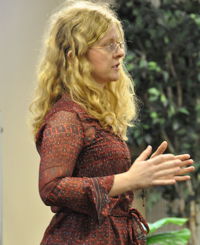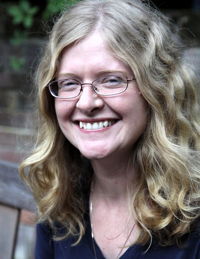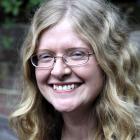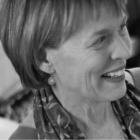Holly, you came to Christianity in your 30s. You had an awareness that something was not right in your life. Did your understanding of sin or of your own sinfulness play a part in your conversion? Do you think our sense of our own goodness, particularly in the academic world, keeps us from God?
It’s a complicated question, because I wouldn’t say that my own thinking of myself as a good person kept me from God, because I didn’t think God existed. And I know that for some people, they have an awareness of God that they’re trying to avoid. But in my case, I just didn’t think that God existed. So my own failure in that respect was simply a challenge in terms of how do you live in the world, how do you live successfully, how is it possible to be happy, how is it possible to have a meaningful life, given what I thought were the parameters of existence, which is to say, you just have to do the best you can. Which actually sounds great on paper. It sounds like, oh, you know, I can just forge forward. Eventually it doesn’t work quite so well in real life, especially if you’re actually honest about what you’re doing.
And so for me, I use the word sin now to talk about what it was I was grappling with. But that wasn’t the word that I would’ve used at the time, and it wasn’t the word that was helpful to me when I was in the process of conversion, which comes down to a lot of what I’m doing right now in my own writing. The word sin has particular meaning for a Christian. We understand what it means. We know theologically what it means. We know experientially what it means. But that meaning is not particularly accessible to the average non-Christian. So for me as a non-Christian not believing in God, my understanding of what the word sin meant was totally different. It was really a list of things that some religious people say are bad to do because a god that I don’t believe exists said so. It wasn’t a category that had any bearing on my life.
But, I did have a recognition that the world wasn’t working the way it ought to, and that “ought” is part of the whole thing that brought me to believe in God. Because why did I have a sense of “ought” in the first place? That was the nose of the camel so to speak, the thin end of the wedge. But I had an awareness — what I articulated as that the world was a broken place. It wasn’t working the way it should, and I myself was also broken in the sense that I could imagine myself being much better than I was actually capable of being. I didn’t know that that’s what Christians understand as sin, because the words weren’t connected to me.
One of the big “Aha!” moments was when I starting learning what Christians actually believe about original sin and the fall. It was like this big light bulb went on, and I said, “Oh! That’s what I’ve been experiencing all my life.” I just didn’t know that was what it was called. As a non-Christian the words “original sin” sound ridiculous. It sounds like, “I am at fault because my long-ago ancestor did something that I don’t even understand why it was wrong.” But if you actually approach it from a different understanding — we’re all cut off from God, we’re lost, the world’s broken — then it makes the most sense in the world, and actually that helped make me realize that Christianity was true.
In your apologetics work, you’re looking at it from the other side. How do you think one can approach this who cares about colleagues who live in this broken world? Are there words that can be used to help bring understanding?
I think so. And I think part of this has to do with thinking about individual word choices and trying to identify when are we using jargon. I think sin can become a jargon word. But talking about things like human flourishing and what impedes human flourishing, those are ways to talk about sin that are not jargony. Or brokenness. I like using that word. Now, granted, sin is a very useful word because it sums it all up. Any individual word, talking about flourishing, talking about brokenness, won’t get the fullness of what sin means. But it also won’t shut people off the way a jargon word will.
I work specifically in literary apologetics. I think the role of literature and the arts is really important in bringing meaning back into these words. There’s no reason why you can’t have meaning for non-Christians and for Christians alike about the word sin, and that’s where story and image really can help put content, meaning into these words again.
Describe literary apologetics.
Literary apologetics is a form of imaginative apologetics, which in turn is a form of cultural apologetics, which is to say it’s engaging with culture and cultural products as opposed to purely being analytical. In particular, imaginative apologetics recognizes the imagination as a mode of knowing. It is possible to grasp truth by experience and by the use of the imagination, as well as by the use of reason. And that includes the visual arts, film, sculpture, dance, and music; literary apologetics would specifically be the literary component. I’m a literary scholar and I’m a poet, so I’m interested in the literature part.
Literary apologetics looks at how literature can present truth, how it can present meaning, and how we can engage with that meaning through literature. It’s actually a much bigger question than just, How do we present a particular Christian idea in literature? Because literary apologetics involves understanding — for instance, the conversation we just had about how do we have a meaning for the word sin. And works by non-Christians as well as Christians are really valuable for this.
From reading your book, I know literature played a role in your own coming to understand something of brokenness and wholeness and flourishing. Can you speak to that? How has reading been important in your own conversion?
It was actually hugely important. It’s something I’ve come to realize even more in the years since I wrote Not God’s Type. I put it in the book, but I’ve realized it’s more significant even than I thought at the time. To begin with, I had been reading Christian authors like C.S. Lewis and J.R.R. Tolkien in particular. To borrow Lewis’s phrase, those authors were “baptizing my imagination” and getting me to think a little bit more, or to feel a little bit more that there was something real about their faith.
I’d had very shallow stereotyped views of what Christians believed. It was when I went back and reread the great Christian poets: John Donne, Gerard Manley Hopkins,George Herbert, etc., that I really came to grips with the fact that this beautiful poetry, written by very smart, thoughtful men, was about something that was totally outside my experience, the experience of faith.
It was clear to me that if I was going to be honest as a reader — and that’s really what being a literary scholar should be about, being honest as a reader and looking at what is the text giving me — that they were talking about something that wasn’t what I called faith, because I considered faith a blind, superstitious thing. That kind of faith wasn’t what they were talking about. It made me want to know, what is it that they’re talking about? What is it that I experience when I read their poetry? That really gave me the openness to actually thinking seriously about what people believe who believe in God, who believe what Christians believe, whereas before, I just assumed it was all nonsense. But the poetry made me realize, whatever this “faith” thing was, though I didn’t think I was going to believe it, but whatever it was, clearly wasn’t nonsense. So I wanted to find out what it was so I could understand the poetry better. Then that of course got me going.
How important do you think it is for Christians to read this great body of literature written by Christians?
I think it’s hugely important for Christians to read literature, and I would broaden it out to not just be literature by Christians, because all truth is God’s truth. And non-Christian writers often speak truth in ways that we need to hear. We need to be able to appreciate listening, to not assume that only people who have accepted Christ have anything true to say ever about the human condition. I really think it’s vitally important for Christians to read, and to read fiction and poetry, because it allows us to imaginatively engage with the world. It allows us to know the world and to know how other human beings relate, to know things about God and his creation, to understand ourselves more deeply.
You’re very widely read. Do you have favorite books that you go back to? Are there some books or poetry that have just been really seminal to you?
There are a few things I do keep coming back to. One of them is Tolkien’s The Lord of the Rings. If it’s not the central book, it’s certainly one of them. I’ve probably read it six or seven times. I just find it deeply nourishing, and it gets more so every time. And The Chronicles of Narnia and Lewis’ Space Trilogy have also been works that I keep coming back to.Those are the ones that have been really shaping for me.
Broadening a bit, Dante’s Divine Comedy has really shaped the way that I think about my spiritual journey and what it means to actually live out the Christian life. You have to really take the Christian life as a journey. And in terms of other poetry, the poet who is the most significant in my life and has been for years and I’m sure will continue to be, is Gerard Manley Hopkins. He’s just really been a guide and companion along the way. I turn again and again to his poetry.
You write poetry.
I do, yes. Actually, it happened in my life in a really interesting way. I would call writing poetry a vocation, and it kind of just happened. About two years ago I started writing poetry again. I literally had not written poetry in almost twenty years. I had not written any poetry, because the poetry I wrote in college was horrible. It was just awful — emo, experimental nonsense. It was just dreadful. I concluded that I couldn’t write poetry. But in the meantime I was reading all this poetry.
And then about two years ago, I was struck with the desire to write a sonnet. There was a sonnet I wanted to write, a little one, and it came out ok. And I kept writing these sonnets.
Since then, I just haven’t stopped. I’ve been continuing to write and because I’ve come to it after reading so much poetry, I actually understand how these closed forms like the sonnet work. Sometimes writing is a discipline for me, but mostly I feel very, very clearly that it’s a vocation that was given to me, to be a poet. It’s my job, really.
What do you think is the job of a poet?
I think the job of a poet is to speak truth. They describe the way things are, both spiritual and material. So I think ultimately, we don’t need to say someone is a Christian poet versus another kind of poet, because if you’re a Christian, you’re going to speak truth. And that truth is going to reflect the living God.
And how does poetry speak that truth in a way that prose does not?
I think that poetry makes use of imagery in different ways. It’s more compressed. And because it’s compressed, actually it’s more open to transcendence, because you’ve got a kind of liminal space. I think poetry can open up in ways that prose cannot. Prose has narrative, which I think is valuable in totally different ways. But I’m thinking particularly of lyrical, closed form, small poetry. It gives you something you can enter into in a small space, and there are multiple possibilities and multiple layers that you can’t get in a longer work.

Any surprises for you teaching as a professor? You’ve been doing this now for several years. Do you enjoy teaching?
Yeah, I love teaching. I’ve been teaching for a long time. I taught as a graduate student, and then I taught for seven years at a community college in California. Now I’m at Houston Baptist University. And I think the thing that surprised me when I became full-time faculty, which I’m used to now, is how much work there is to do that’s not what people think of as “teaching.” There’s all the administrative work that even regular faculty members have to do — paperwork, committee meetings, recording grades, and so on. And even for teaching, what you see in the classroom is just the tip of the iceberg as far as preparation goes. In the class, having a discussion, it may look like I’m coming in and talking to my students, but there’s a tremendous amount underneath of prep work, of reading, of knowing about the particulars of the students that I have, what do they need, what do they understand, and where are the gaps, and what do I want them to get out of this — it’s amazing how much more you need to know of the material than you think you do.
There really is a lot that has to happen conceptually outside the classroom, and then when that’s done, then the classroom experience seems very easy. When I was a new teacher, I used to have these detailed lesson plans down to five or ten minute increments of what we would do for activities, and that was helpful at the time. It covered what I would do if we ran out of things to do. That used to be a problem — now the problem is always that we don’t have time for all the things I want to do.
But one of the things that I came to understand wasn’t something I had learned as a graduate student but something I learned as a full-time faculty. You need to be able to think on the fly. It’s an organic situation that includes my students, their preparation, their state of mind on that given day, what I know, where I want them to go... so there’s going to be decision-making processes that happen within the classroom that you can’t possibly prep for. You can only respond as you go. Sometimes the best decision is to scrap everything you’ve planned and do something totally different — but that decision has to be based on experience of recognizing when something isn’t working, and understanding why, and having a number of different alternatives in your head, so you can smoothly transition over to something else. Teaching is creative work in real time.
I taught a year as a high school teacher in between when I finished my graduate work and before I went back to college teaching. I was a complete failure as a high school teacher. One of the reasons I was a failure was that I wasn’t actually particularly competent. I was teaching Spanish and French, not teaching in my field. Now if I had just recognized that, I probably would have done okay, but instead I was trying to fake it. I want to add, many people, at some point, are distressed by the feeling that they’re faking it, but in fact they’re not; they’re just nervous, which isn’t itself a bad thing. Just because you feel like an impostor doesn’t mean that you actually are.
We have heard that — I feel like an imposter — from some women in academia.
Actually men will sometimes say it too. When I’ve felt like an impostor, I just had to recognize, I may feel like I’m not qualified, but evidently the people who hired me think I am. My feelings are irrelevant. I just need to do my job.
That said, there are times that I can recognize that my skill set doesn’t match the needs of my position. That was the case in my high school teaching. At that point, the right response would have been not to just bluster through it; the right response would have been to admit that I was having trouble and seek some more help. I didn’t — this was before I was a Christian, and I didn’t have any idea how to deal with the real issues, which were spiritual — pride, humility, patience, insecurity. My failure and insecurity in the classroom was part of what eventually convicted me of my own fallen nature: I could envision what kind of teacher these kids needed, and I was totally unable to be that person.
When I became a Christian I realized precisely that the problem was not my lesson plan; the problem was my character. And so a lot of my development as a teacher has been connected to my discipleship as a Christian. Repenting for when I was impatient, for when I was angry, for when I was frustrated, recognizing my own failings, and learning to follow Christ has formed the basis for growing as a teacher, and, really, as an academic and a writer too. And it has actually translated into a deep confidence in my vocation as a teacher. I can say to myself, hey, God has called me to be where I am, so I’m going to be there. I can have confidence that wherever I am, I can offer my teaching to my students, and we’ll go from there. I think that sense of confidence that I have in my work doesn’t come from any one moment or insight, but rather from the day in, day out work of teaching. That involves seeing the results over many different groups of students, and understanding my own limits, and allowing room for God’s grace to operate in my students’ lives and in my life.






